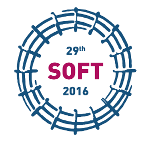Speaker
Ajith Kumar
(Cooling Water System)
Description
While the decisive feat of any concept is ‘successful implementable design’, the process of converting the concept into practically executable design is critical and challenging. It is usual to initiate any design on the basis of challenges visible during the conceptualization, as no project can really be a repeat of another. However, during conceptual design phase, it may not be possible to include all key interfaces and practical issues as they emerge progressively with the progress of design. Unforeseen challenges emerged and, along with the foreseen ones, tested the progress of detailed design of ITER Component Cooling Water System (CCWS), Chilled Water System (CHWS) and Heat Rejection System (HRS). ITER being ‘one-of-a-kind’ project, has unique and very conservative design requirements. While trying to meet these requirements through system design, revisiting of those requirements was essential so as to complete the design within the constraints. In addition, as some of the auxiliary client system designs progressed through prototyping, new or revised requirements were identified. Since ITER is an experimental facility, accommodating the provisions like early operation, partial operation, capacity augmentation influenced the progress of detailed design. In a project like ITER, where the interfaces are complex and rigid, the development and implementation of the system design was challenging, given the fact that multiple collaborating agencies were performing concurrent engineering.
This paper captures the challenges faced during the detailed design phase of ITER CCWS, CHWS and HRS and describes the solutions that were eventually found in addressing those challenges while maintaining compliance to the technical requirements
Co-authors
Aditya Singh
(Cooling Water System, ITER-India, Institute For Plasma research, Bhat, Near Indira Bridge, Gandhinagar, Gujarat, India)
Ajith Kumar
(Cooling Water System, ITER-India, Institute For Plasma research, Bhat, Near Indira Bridge, Gandhinagar, Gujarat, India)
Dell'Orco Giovanni
(Cooling Water Section, ITER Organization, Route de Vinon sur Verdon, 13115 St Paul Lez Durance, France)
Dinesh Gupta
(Cooling Water System, ITER-India, Institute For Plasma research, Bhat, Near Indira Bridge, Gandhinagar, Gujarat, India)
Gumansinh Gohil
(Cooling Water System, ITER-India, Institute For Plasma research, Bhat, Near Indira Bridge, Gandhinagar, Gujarat, India)
Hiren Patel
(Cooling Water System, ITER-India, Institute For Plasma research, Bhat, Near Indira Bridge, Gandhinagar, Gujarat, India)
Jinendra Dangi
(Cooling Water System, ITER-India, Institute For Plasma research, Bhat, Near Indira Bridge, Gandhinagar, Gujarat, India)
Lalit Sharma
(Cooling Water System, ITER-India, Institute For Plasma research, Bhat, Near Indira Bridge, Gandhinagar, Gujarat, India)
Liliana Teodoros
(Cooling Water Section, ITER Organization, Route de Vinon sur Verdon, 13115 St Paul Lez Durance, France)
Mahesh Jadhav
(Cooling Water System, ITER-India, Institute For Plasma research, Bhat, Near Indira Bridge, Gandhinagar, Gujarat, India)
Mohit Kumar
(Cooling Water System, ITER-India, Institute For Plasma research, Bhat, Near Indira Bridge, Gandhinagar, Gujarat, India)
Nirav Patel
(Cooling Water System, ITER-India, Institute For Plasma research, Bhat, Near Indira Bridge, Gandhinagar, Gujarat, India)
Rakesh Ranjan
(Cooling Water System, ITER-India, Institute For Plasma research, Bhat, Near Indira Bridge, Gandhinagar, Gujarat, India)
Steve Ployhar
(Cooling Water Section, ITER Organization, Route de Vinon sur Verdon, 13115 St Paul Lez Durance, France)

